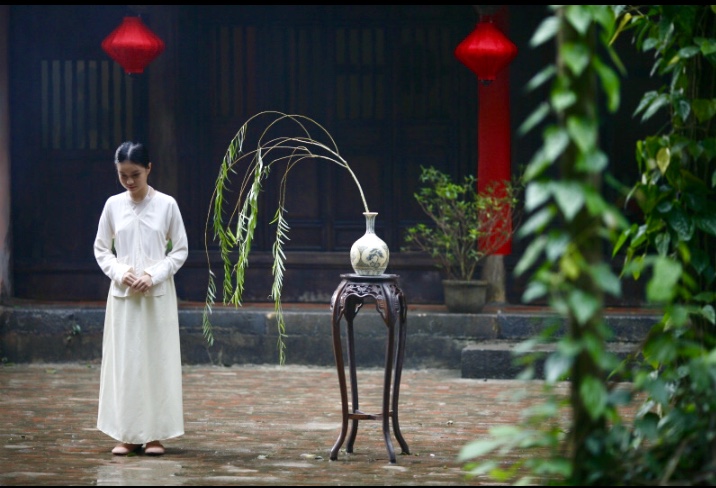THE THIRD WIFE
Directing: A
Acting: A
Writing: A
Cinematography: A
Editing: A
When it comes to patriarchy, it seems it’s just the same shit, different day — and different place.
The Third Wife has a unique point of view for American audiences in particular. It’s one thing to get a window into other cultures through foreign films, and another for that film to be a period piece. Sure, there are history buffs with a working knowledge of history around the world. But this one gets pretty specific: late-nineteenth-century Vietnam. And although that country has a more recent history quite obviously inextricably linked to that of the United States, such events were far from even a glimmer on the horizon for the Vietnamese, say, 125 or 150 years ago.
The opening title card introduces us to May (Nguyen Phuong Tra My), a young woman — to us, a child — who has become the third wife to “a wealthy land owner.” And this is indeed her story, skipping how she was chosen to be wed to this man and starting with the beginning of her married life. The custom of displaying her bloody sheet on her wedding night for all of her community to see, evidently, was widespread the world over. All the movies I have seen depicting this custom prior to this have been western, or Eastern European.
Written and directed by Ash Mayfair, who is herself Vietnamese, The Third Wife is quite deceptively serene in its storytelling, from its gorgeous cinematography depicting rural 19th-century Vietnam, to the quiet delivery of the dialogue and action. Only in rare cases do the proceedings get overtly dramatic, and they are always brief. This is a depiction of a quiet way of life, and it seems that is the point: the way girls and women fit into this society is not just something everyone is resigned to. It’s literally all they know.
Some details are only heartbreaking in retrospect, and regarded by many with neutrality at the time. Mayfair includes a subplot wherein it’s a young man who is devastated to be expected to marry a girl chosen for him, when he is in love with another. And here, even when it’s the man who breaks from tradition and accepted moral codes, it is the girl who gets blamed an punished: her father refuses to take her back, and asks her what she did to keep the man from wanting to touch her.
But his reasons are obvious but unspoken. May is herself only fourteen, learning the ways of her wealthy yet still repressed life as she goes along, and spends much of the story pregnant. This other girl is even younger. Her age is never stated, but she hardly looks older than ten. The man, himself young but still much older than her, is quite understandably not even interested. The girl attempts to undress for him on their wedding night and he barks at her to stop.
Mayfair treats her characters, to a person, with unusual empathy. It does not feel pointed that none of the men in this story are villainized, only that it was unnecessary. The men, by and large, are acting according to cultural strictures, just as the women and girls are. No one here is depicted as especially malicious. The caning of a young man who impregnated a woman out of wedlock is not so much a conscious evil as it is simply part of the rules. This is a society of people who lead otherwise peaceful lives, albeit in a deceiving way, given the subtle cancer that is sexism the world over.
It’s hard not to love Mayfair’s choice of perspective here. This is not the story of men who oppress, but rather the story of women who are barely even aware of the oppressive society in which they live. As such, The Third Wife features all of about three male speaking parts, and their combined dialogue is very limited. The husband to the three wives in question, who form a sort of sisterhood amongst themselves, is barely heard talking at all.
I can think of nothing negative to say about The Third Wife. I can think of nothing wrong with it — even though it caused some controversy in Vietnam itself, which pulled it from local release. One might have some ambivalence about the age of the lead actor, who was only 13 years old during shooting. I did not learn that particular detail until after seeing the movie, during which I did wonder how old she was — never thinking she could be that young. This may make little difference to some, but by all accounts the young actor is a precocious one, with a nuanced understanding of the script, and even though she was involved in some “intimate” scenes, none of them were outright sex scenes and none involved nudity. Well, now that I think about it, there is one scene in which she french kisses one of the other wives, who is much older than her. Any sane person would feel ambivalent about that at best.
I have no idea how much leeway to give cultural differences here. If nothing else, there is some comfort in the director having been a woman, with a clear vision of the story she was telling and an intricate understanding of the sexual politics involved. How appropriate was Nguyen Phuong Tra My for this part, then? That’s hard to say. I’m choosing to separate that knowledge from the final product onscreen, which is sublime in its presentation. It’s too bad its local theatrical run is limited to three days, and ends tomorrow. Its quiet, melancholy beauty is certainly best appreciated on the big screen.
A girl arguably too young for the part plays a girl too young to be married.
Overall: A

